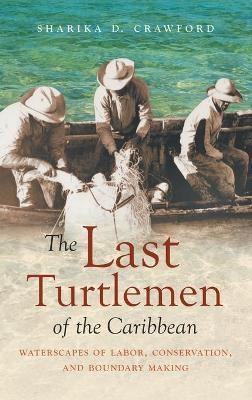
The Last Turtlemen of the Caribbean
Waterscapes of Labor, Conservation, and Boundary Making
Seiten
2020
The University of North Carolina Press (Verlag)
978-1-4696-6020-2 (ISBN)
The University of North Carolina Press (Verlag)
978-1-4696-6020-2 (ISBN)
Illuminating the entangled histories of the people and commodities that circulated across the Atlantic, Sharika Crawford assesses the Caribbean as a waterscape where imperial and national governments vied to control the profitability of the sea.
The labor of turtle hunters and the shaping of Caribbean history.
Illuminating the entangled histories of the people and commodities that circulated across the Atlantic, Sharika D. Crawford assesses the Caribbean as a waterscape where imperial and national governments vied to control the profitability of the sea. Crawford places the green and hawksbill sea turtles and the Caymanian turtlemen who hunted them at the center of this waterscape. The story of the humble turtle and its hunter, she argues, came to play a significant role in shaping the maritime boundaries of the modern Caribbean.
Crawford describes the colonial Caribbean as an Atlantic commons where all could compete to control the region's diverse peoples, lands, and waters and exploit the region's raw materials. Focusing on the nineteenth and twentieth centuries, Crawford traces and connects the expansion and decline of turtle hunting to matters of race, labor, political and economic change, and the natural environment. Like the turtles they chased, the boundary-flouting laborers exposed the limits of states' sovereignty for a time but ultimately they lost their livelihoods, having played a significant role in legislation delimiting maritime boundaries. Still, former turtlemen have found their deep knowledge valued today in efforts to protect sea turtles and recover the region's ecological sustainability.
The labor of turtle hunters and the shaping of Caribbean history.
Illuminating the entangled histories of the people and commodities that circulated across the Atlantic, Sharika D. Crawford assesses the Caribbean as a waterscape where imperial and national governments vied to control the profitability of the sea. Crawford places the green and hawksbill sea turtles and the Caymanian turtlemen who hunted them at the center of this waterscape. The story of the humble turtle and its hunter, she argues, came to play a significant role in shaping the maritime boundaries of the modern Caribbean.
Crawford describes the colonial Caribbean as an Atlantic commons where all could compete to control the region's diverse peoples, lands, and waters and exploit the region's raw materials. Focusing on the nineteenth and twentieth centuries, Crawford traces and connects the expansion and decline of turtle hunting to matters of race, labor, political and economic change, and the natural environment. Like the turtles they chased, the boundary-flouting laborers exposed the limits of states' sovereignty for a time but ultimately they lost their livelihoods, having played a significant role in legislation delimiting maritime boundaries. Still, former turtlemen have found their deep knowledge valued today in efforts to protect sea turtles and recover the region's ecological sustainability.
Sharika D. Crawford is associate professor of history at the United States Naval Academy.
| Erscheinungsdatum | 11.09.2020 |
|---|---|
| Reihe/Serie | Flows, Migrations, and Exchanges |
| Zusatzinfo | 7 halftones, 2 maps, 1 table |
| Verlagsort | Chapel Hill |
| Sprache | englisch |
| Maße | 155 x 235 mm |
| Themenwelt | Sachbuch/Ratgeber ► Natur / Technik ► Naturführer |
| Geisteswissenschaften ► Geschichte ► Regional- / Ländergeschichte | |
| Technik ► Umwelttechnik / Biotechnologie | |
| ISBN-10 | 1-4696-6020-2 / 1469660202 |
| ISBN-13 | 978-1-4696-6020-2 / 9781469660202 |
| Zustand | Neuware |
| Haben Sie eine Frage zum Produkt? |
Mehr entdecken
aus dem Bereich
aus dem Bereich
Buch | Hardcover (2019)
Quelle & Meyer (Verlag)
CHF 55,90


